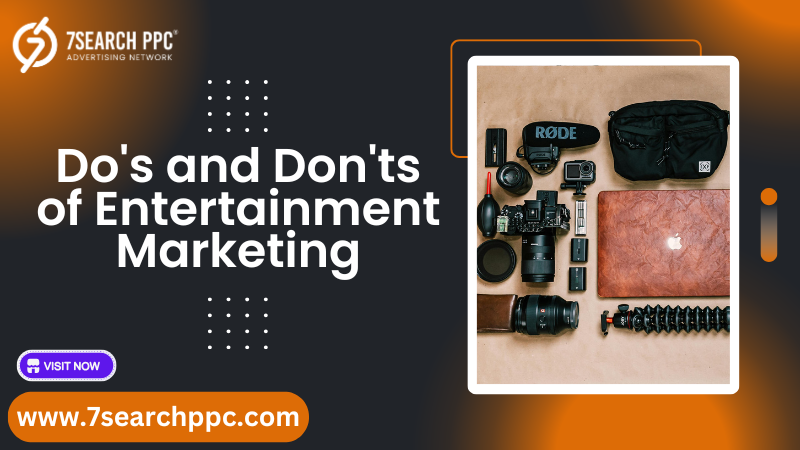Entertainment marketing is an exciting yet challenging field where creativity meets strategy. In a world flooded with online ads and increasing competition, crafting impactful campaigns that resonate with audiences can make or break a brand’s presence in the entertainment industry. Successful entertainment marketing promotes media content and engages fans in a way that builds loyalty, drives views, and enhances brand perception. But like any field, there are best practices—and pitfalls to avoid.
Let’s explore the essential do’s and don’ts of entertainment marketing, from leveraging ads effectively to harnessing media ad networks and alternative media advertising.

Understanding Entertainment Marketing
Entertainment marketing is about promoting media content, such as movies, TV shows, music, sports, or gaming, to a targeted audience. This form of marketing isn’t just about creating ads; it’s about crafting experiences that bring audiences closer to the content and encourage genuine interaction. To do this effectively, marketers need to understand audience interests, preferred media channels, and trends.
Do’s of Entertainment Marketing
Identify Your Audience
One of the most crucial aspects of entertainment marketing is understanding your target audience. Knowing who you’re marketing to can make the difference between a successful campaign and one that misses the mark.
Research Demographics and Preferences
Spend time researching audience demographics, psychographics, and media consumption habits. For instance, younger audiences might prefer content on social media and streaming platforms, while older generations may engage more with traditional media. Tailoring your campaigns to these preferences increases relevance and engagement.
Use Audience Segmentation
Segmenting your audience allows you to create specific content that appeals to different groups. Whether by age, location, or interests, tailored ads ensure you reach the right people in the right way. This is particularly effective when using online ads or media ad networks that offer segmentation tools.
Utilize Media Ad Networks
Media ad networks are powerful tools in entertainment marketing, helping brands reach larger and more targeted audiences.
Choose the Right Network
The media ad network you choose can determine the reach and effectiveness of your campaign. Networks such as Google Ads, YouTube, and Hulu Ad Manager allow entertainment brands to place their content in front of viewers actively engaging with media.
Optimize Ad Formats
Media ad networks provide multiple ad formats, from video ads to banner ads and sponsored content. Choose formats that align with your content and audience preferences. For instance, a streaming service might use video ads to showcase a trailer, while an artist might prefer banner ads to promote a new album.
Embrace Alternative Media Advertising
Alternative media advertising refers to non-traditional advertising channels like social media influencers, podcasts, virtual reality, and more. These platforms allow entertainment brands to reach audiences in innovative ways.
Partner with Influencers
Influencers can help amplify your message and bring authenticity to your campaign. Partnering with influencers in your niche allows you to reach their dedicated followers and build credibility. For instance, a gaming company might collaborate with a popular gamer on Twitch, while a music brand might connect with influencers on Instagram.
Explore Emerging Platforms
Stay updated on emerging platforms and trends, as these provide new ways to engage audiences. Virtual reality and augmented reality are especially impactful in entertainment marketing, as they allow users to immerse themselves in the content.
Create Compelling and Engaging Content
Content is king, especially in entertainment marketing. High-quality, engaging content will capture attention and hold it.
Use Storytelling
Storytelling allows you to connect emotionally with your audience. Craft narratives that resonate with their experiences and interests, making them more likely to engage with your brand. A well-told story in an ad can be as powerful as the content it’s promoting.
Leverage Visuals and Music
Strong visuals and music are essential in entertainment marketing. For example, creating a striking visual ad for social media or an evocative music track for a movie trailer can captivate your audience and enhance brand recognition.
Optimize for SEO
Search Engine Optimization (SEO) helps your content reach a wider audience. By optimizing for keywords like “Entertainment Marketing,” “Ads Entertainment,” and “Media Ad Network,” you can improve your content’s ranking on search engines.
Conduct Keyword Research
Identify keywords related to your content and incorporate them naturally into your titles, descriptions, and body text. Keywords like “alternative media advertising” and “online ads” will increase visibility and attract the right audience.
Optimize for Mobile
Many users access entertainment content on mobile devices. Ensure your website, ads, and social media content are mobile-friendly to provide a seamless experience.
Don’ts of Entertainment Marketing
Don’t Ignore Data and Analytics
Analytics provide valuable insights into campaign performance, audience engagement, and ROI. Ignoring this data can lead to missed opportunities and poor marketing decisions.
Avoid Over-Reliance on Vanity Metrics
While likes, shares, and comments are important, they don’t always reflect true engagement or conversions. Focus on actionable metrics like click-through rates, time spent on content, and conversion rates to assess campaign success.
Don’t Neglect A/B Testing
A/B testing helps you understand what works best for your audience. Experiment with different headlines, visuals, or ad formats to see which versions drive the most engagement and conversions.
Don’t Overload Audiences with Ads
In entertainment marketing, balance is crucial. Bombarding audiences with ads can lead to ad fatigue and negatively impact brand perception.
Avoid Ad Clutter
Limit the frequency of your ads to avoid overwhelming your audience. Instead of multiple ads, invest in a few impactful ones that genuinely capture attention and deliver value.
Be Selective with Retargeting
Retargeting is effective but can be overdone. Ensure you’re not following users too aggressively, as this can create frustration. Balance is key; use retargeting as a reminder, not a constant push.
Don’t Underestimate Content Quality
The entertainment industry is about delivering high-quality, memorable experiences. Poor-quality ads or content can harm your brand and diminish trust.
Avoid Low-Resolution Visuals
Always use high-quality visuals in your campaigns. Blurry or pixelated images can make your brand look unprofessional and discourage engagement.
Don’t Forget About Clear Branding
Ensure that your branding is present and consistent across all content. This strengthens brand recognition and allows your audience to quickly associate the content with your brand.
Don’t Disregard Platform Guidelines
Each advertising platform has its own rules and best practices. Disregarding these can result in penalties or limited reach.
Be Mindful of Ad Policies
Platforms like Facebook, YouTube, and Google have strict ad policies. For instance, some restrict certain language or imagery, especially for sensitive or explicit content. Following these guidelines ensures that your ads remain visible and accessible to your audience.
Respect Privacy and Data Regulations
When using audience data for targeting, adhere to privacy laws such as GDPR. Transparency and consent are vital in maintaining a positive relationship with your audience.
How Media Ad Networks Enhance Entertainment Marketing
Media ad networks play an important role in entertainment marketing by simplifying the ad-buying process and expanding reach. These networks connect brands with websites, apps, and social media platforms where their ads can reach millions of viewers.

Advantages of Media Ad Networks
Media ad networks offer various advantages for entertainment marketers:
- Access to Large Audiences: These networks provide access to millions of viewers, allowing brands to scale campaigns effectively.
- Targeted Advertising: By utilizing data on user preferences and behavior, media ad networks ensure ads reach the right audience.
- Cost-Effective Options: Networks often offer a range of budget options, making it accessible for brands of all sizes.
Choosing the Right Media Ad Network
Consider factors like audience reach, ad format options, and pricing structure when selecting a media ad network. Popular options for entertainment brands include YouTube for video content, Facebook for social engagement, and programmatic ad networks for display advertising.
Effective Strategies for Alternative Media Advertising
Alternative media advertising helps entertainment brands stand out by leveraging unconventional channels and formats. Here are some popular methods to consider:
Podcast Sponsorships
Podcast sponsorships allow brands to reach niche audiences through long-form content. This can be particularly effective for movies, shows, or events with dedicated fan bases.
Interactive Ads
Interactive ads, such as quizzes or “choose-your-own-adventure” experiences, engage viewers and create memorable interactions. Entertainment brands can use these to promote upcoming releases or enhance audience engagement.
Experiential Marketing
Experiential marketing creates real-world experiences for audiences. For example, pop-up events, movie-themed escape rooms, or virtual premieres offer fans a unique, immersive experience.
Conclusion
Entertainment marketing requires a careful blend of creativity, strategy, and data-driven insights. By following these do’s and avoiding common pitfalls, brands can craft campaigns that captivate audiences, build loyalty, and drive results. Leveraging media ad networks and alternative media advertising, optimizing for SEO, and keeping audiences at the center of your efforts will help your brand thrive in the competitive entertainment landscape.
Frequently Ask Questions (FAQs)
What is the role of media ad networks in entertainment marketing?
Ans. Media ad networks connect brands with a large audience by displaying ads on relevant websites, apps, and social platforms. They help entertainment marketers reach targeted audiences, optimize budget, and increase the visibility of their content.
How does alternative media advertising benefit entertainment brands?
Ans. Alternative media advertising offers entertainment brands unique ways to engage with audiences through non-traditional channels. This includes podcast sponsorships, influencer partnerships, and experiential marketing, which create memorable brand interactions.
Why is audience segmentation important in entertainment marketing?
Ans. Audience segmentation helps tailor marketing content to specific groups, enhancing relevance and engagement. By understanding the preferences of different audience segments, brands can create more effective campaigns that resonate with each group.


